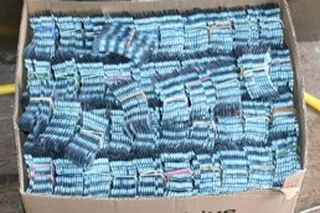From Dublin to Havana, Mark locates new life
Viva is a Cinderella story set in the Havana drag scene. Writer and actor Mark O'Halloran tells our reporter how the film helped pick him up
Mark O'Halloran's new drama was long-listed for an Oscar this year. Photo: Steve Humphreys
Sometimes it takes the outsider to properly examine a land and its people. For writer and actor Mark O'Halloran, travelling, sitting and watching are the best kindling for inspiration.
With Adam & Paul (2004), he even managed to view his capital city as a foreign land.
O'Halloran wrote and starred in Lenny Abrahamson's beloved Beckettian tragicomedy, drawing on his time as an acting student fresh off the bus from Ennis in the early 1990s. To him, Dublin was another world, and it marked the first time he'd ever seen a heroin addict.
"That was the first screenplay I wrote," the 46-year-old recalls. "It was set in Dublin and I'm not from Dublin. I wanted to see how far you could push that. Can you step into somebody else's culture and sit and observe them and then write about them?"
That film, his following screenplay for Lenny Abrahamson's sophomore feature Garage (set deep in the midlands) and now Viva, a Cuban Cinderella story, prove that you very much can. And to award-wooing effect, at that.
The path from Adam & Paul to Viva was not a straightforward one for O'Halloran. His best friend, former partner and Adam & Paul co-star Tom Murphy passed away in 2007, struck down by non-Hodgkin lymphoma (the same illness that claimed Mark's brother some years previously) just as Garage was hitting cinemas. Unable to work, O'Halloran hit the road, travelling through the Middle East, Balkans and Far East. Viva was part of what picked him back up. The other was a more practical concern.
"I came home and said, right I better pay off my credit card bill!" he laughs before a calm smile settles on his distinct features. "Things move on and mourning lifts after a while. Then Viva came along and I was moved into a whole different world. And then I went back on stage to do some acting. Death is a reality of life and we have to deal with it."
Viva, you may recall, was Ireland's submission for this year's Best Foreign Language Oscar. Despite not securing a nomination for that decidedly green-tinged ceremony (that saw nods for Brooklyn, Room and Stutterer), the film has garnered huge goodwill.
It centres on the story of Jesus (Hector Medina), a young man in Havana with aspirations to be a performer in a local drag club. His estranged alcoholic father turns up one night in the club as Jesus is performing and violently re-enters his life, forbidding him from further participation. It is an exquisite work, shot entirely on location with Spanish dialogue against the enthralling socio-economic backdrop of the Caribbean communist stronghold. Initially unsure during a brief reconnaissance trip with director Paddy Breathnach, O'Halloran returned to research the screenplay and fell deeply in love with the island and its people.
"I read all the Cuban literature, listened to the music and watched all the films. I suddenly began to get to know the place. It was an interesting journey but it was the same process as I'd use to write a film here which is sitting down and talking to people, watching what life is like. Pure observation."
To his surprise, he discovered a thriving drag scene in a society where boxing, drinking and general machismo are highly prized. "Any of the drag queens I talked to had difficulty with their fathers especially, not the homosexuality thing but with effeminacy, and men finding it hard that they'd have an effeminate son. They'd be disgusted by it and react violently sometimes. There was a lot of those stories around, so I wanted to write something that talks about those extremes. I myself personally don't accept it as a fact that effeminacy is a weakness. I've met very macho guys who are weak people. That's what the film is exploring."
All writers pepper elements of themselves into their work, and O'Halloran, who also has a small role in the film, admits he is no different. "My own relationship with my father wasn't troubled but I think possibly there was a lack of understanding between us both, and both of us had fault in that so maybe I was thinking about that. He was a very macho person, a very masculine man and a very sporty man. And I wasn't any of those things. He died when I was 27 and I think we missed the years where you put all that aside and get to know each other. The way I wrote this film, Jesus does get to know his father."
He hopes Viva can help stir a similar conversation in Cuba to the one that led up to Ireland's historic Marriage Referendum last year, something he refers to as "a new maturity" for the country. "My mother is in her 80s and she made a video for the internet supporting it and canvassed in Ennis. It did spell a change. It's like as if we're owning ourselves for the first time."
That concept of expression being released has been dear to O'Halloran ever since a move to Amsterdam at the age of 20, when it was still illegal to be gay in Ireland. It extends outwards, he believes, beyond Dublin and Cuba to a more universal truth that everyone can relate to when their real selves are repressed for whatever reason.
"To thoughtfully cast things off is what it's about," he ponders. "It's not about throwing everything away, because our families are precious to us. But it's about saying, there's room for my family as well. Jesus is a good boy, and good boys like him should be cherished."
Viva is in selected cinemas nationwide from Friday
Join the Irish Independent WhatsApp channel
Stay up to date with all the latest news














